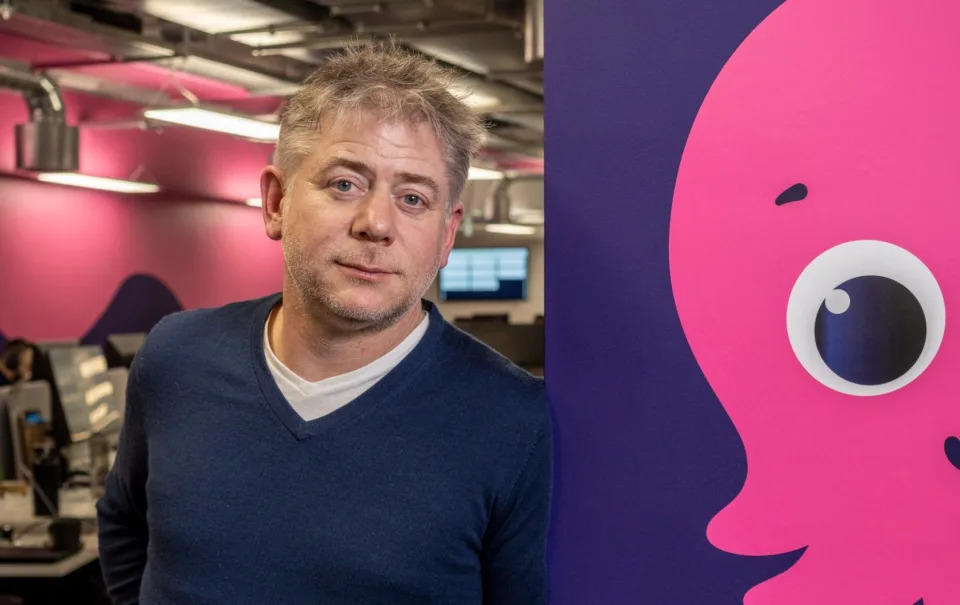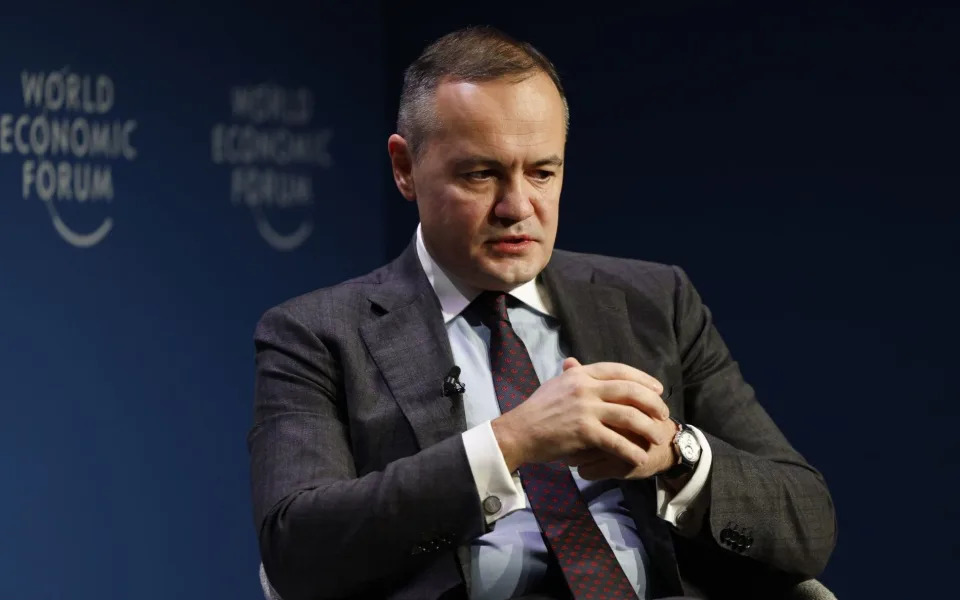Octopus in talks to help power Ukraine after Russia smashes grid
Matt Oliver
Sun, 28 January 2024

Greg Jackson: ‘The UK can learn from Ukraine’s impressive ability to built energy infrastructure so quickly – and under fire’ - Andrew Crowley
British energy supplier Octopus is in talks to help power Ukraine as the country rebuilds its electricity grid following Vladimir Putin’s bombing onslaught.
The company has held exploratory talks with Kyiv-based DTEK, Ukraine’s biggest private energy company, about how the two businesses can work together.
It is understood this could potentially include Octopus licensing its groundbreaking Kraken energy management software to DTEK or even going one step further and forming a joint venture with the company, as Octopus has done with energy providers in other markets such as Japan.
The discussions come amid a long-running Russian bombing campaign to target Ukraine’s energy infrastructure, with the aim of depriving the public of power or heat during the coldest winter months.
Russia’s efforts have galvanised support in Ukraine for renewable energy, with the more distributed nature of wind turbines and solar panels making them smaller targets than large coal power stations.
Greg Jackson, chief executive of Octopus, held initial discussions with Maxim Timchenko, DTEK’s chief executive, on the sidelines of the World Economic Forum in Davos, Switzerland earlier this month.

Mr Timchenko met Octopus Energy’s Jackson at Davos - Stefan Wermuth/Bloomberg
Both men stressed talks are at an early stage but were enthusiastic about the potential for cooperation.
Mr Timchenko said: “We want to learn from this company [Octopus] and we want to bring this innovation to Ukraine.”
A potential deal between the two would mark yet another foreign expansion for UK household supplier Octopus, which already operates Germany, the US, Japan, Spain, Italy, France and New Zealand as well.
Many of the company’s global agreements have been propelled by demand for its Kraken software, which can manage energy assets such as wind turbines as well as customer service databases.
Kraken is now used by utility companies in 17 countries to serve 54m users.
Mr Jackson said: “Ukraine – and DTEK – has shown the agility, the speed, at which you can both upgrade and build new electricity infrastructure.
“We can learn a lot from them, for example about how they’ve been able to so quickly and so impressively do work – often under fire – that in the UK often takes five to 15 years. And if you take a decentralised system like they’ve been building, I think it’s a good example of the kind of situation where Kraken can be very effective.
“I can’t preempt where it goes. But let’s just say, I’d be delighted if we can find a way to work together in Ukraine, and in the rest of Europe.”
Following its takeover of Shell Energy last year, Octopus is now Britain’s second-biggest energy supplier with about 6.6m customers.
DTEK, meanwhile, is one of Ukraine’s biggest electricity suppliers with about 3.5m customers across the Kyiv, Donetsk and Dnipro regions.
Since the outbreak of war with Russia, the company has been scrambling to bolster its electricity grid with decentralised wind and solar farms.
It won plaudits last year for completing the construction of a wind farm in southern Ukraine, 60 miles from the frontline, in just nine months.
DTEK has also begun building renewable energy projects outside of Ukraine, with schemes online in Romania and others planned in Italy, Poland and Croatia.
Mr Timchenko said DTEK was keen to look at opportunities to deploy Octopus’ Kraken software across the business, as well as the potential for a joint venture between the two companies.
There was potential to test Octopus’ technology “outside of Ukraine as well”, he added.
Matt Oliver
Sun, 28 January 2024

Greg Jackson: ‘The UK can learn from Ukraine’s impressive ability to built energy infrastructure so quickly – and under fire’ - Andrew Crowley
British energy supplier Octopus is in talks to help power Ukraine as the country rebuilds its electricity grid following Vladimir Putin’s bombing onslaught.
The company has held exploratory talks with Kyiv-based DTEK, Ukraine’s biggest private energy company, about how the two businesses can work together.
It is understood this could potentially include Octopus licensing its groundbreaking Kraken energy management software to DTEK or even going one step further and forming a joint venture with the company, as Octopus has done with energy providers in other markets such as Japan.
The discussions come amid a long-running Russian bombing campaign to target Ukraine’s energy infrastructure, with the aim of depriving the public of power or heat during the coldest winter months.
Russia’s efforts have galvanised support in Ukraine for renewable energy, with the more distributed nature of wind turbines and solar panels making them smaller targets than large coal power stations.
Greg Jackson, chief executive of Octopus, held initial discussions with Maxim Timchenko, DTEK’s chief executive, on the sidelines of the World Economic Forum in Davos, Switzerland earlier this month.

Mr Timchenko met Octopus Energy’s Jackson at Davos - Stefan Wermuth/Bloomberg
Both men stressed talks are at an early stage but were enthusiastic about the potential for cooperation.
Mr Timchenko said: “We want to learn from this company [Octopus] and we want to bring this innovation to Ukraine.”
A potential deal between the two would mark yet another foreign expansion for UK household supplier Octopus, which already operates Germany, the US, Japan, Spain, Italy, France and New Zealand as well.
Many of the company’s global agreements have been propelled by demand for its Kraken software, which can manage energy assets such as wind turbines as well as customer service databases.
Kraken is now used by utility companies in 17 countries to serve 54m users.
Mr Jackson said: “Ukraine – and DTEK – has shown the agility, the speed, at which you can both upgrade and build new electricity infrastructure.
“We can learn a lot from them, for example about how they’ve been able to so quickly and so impressively do work – often under fire – that in the UK often takes five to 15 years. And if you take a decentralised system like they’ve been building, I think it’s a good example of the kind of situation where Kraken can be very effective.
“I can’t preempt where it goes. But let’s just say, I’d be delighted if we can find a way to work together in Ukraine, and in the rest of Europe.”
Following its takeover of Shell Energy last year, Octopus is now Britain’s second-biggest energy supplier with about 6.6m customers.
DTEK, meanwhile, is one of Ukraine’s biggest electricity suppliers with about 3.5m customers across the Kyiv, Donetsk and Dnipro regions.
Since the outbreak of war with Russia, the company has been scrambling to bolster its electricity grid with decentralised wind and solar farms.
It won plaudits last year for completing the construction of a wind farm in southern Ukraine, 60 miles from the frontline, in just nine months.
DTEK has also begun building renewable energy projects outside of Ukraine, with schemes online in Romania and others planned in Italy, Poland and Croatia.
Mr Timchenko said DTEK was keen to look at opportunities to deploy Octopus’ Kraken software across the business, as well as the potential for a joint venture between the two companies.
There was potential to test Octopus’ technology “outside of Ukraine as well”, he added.
No comments:
Post a Comment